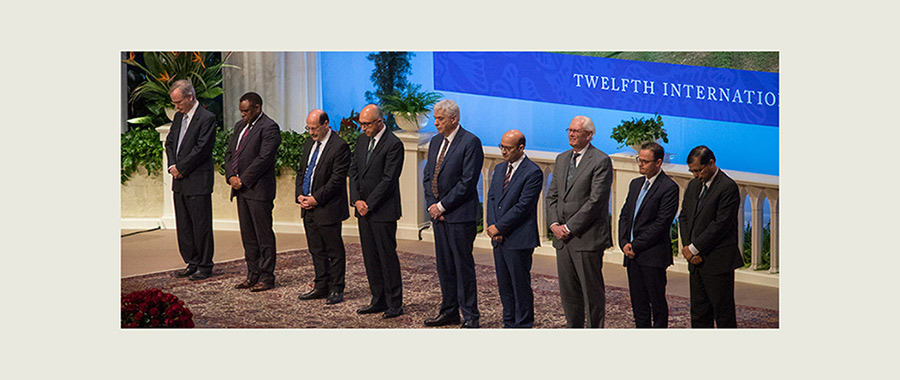The Universal House of Justice, the supreme governing body of the Bahá’í Faith, plays a pivotal role in the spiritual and administrative affairs of the global Bahá’í community. As an institution endowed with significant responsibilities and spiritual authority, its election process represents not only a manifestation of democratic principles but also a deep-seated commitment to collective decision-making. In understanding the implications of the election of the Universal House of Justice, it is essential to delve deeper into various facets surrounding this esteemed institution.
Firstly, the structure and composition of the Universal House of Justice warrant thorough exploration. Comprised of nine members elected by the members of National Spiritual Assemblies worldwide, its electoral procedures are meticulously outlined in Bahá’í canonical texts. The voting process is conducted through secret ballots, ensuring confidentiality and protecting the integrity of the electoral procedure. Such a framework fosters an environment where representatives are chosen based on their merit, spiritual insights, and dedication to the Bahá’í principles.
Secondly, an examination of the responsibilities of the Universal House of Justice elucidates its profound significance within the Bahá’í Faith. It is charged with guiding the Bahá’í community in matters of doctrine and policy. This involves addressing contemporary challenges and questions that arise within society while upholding the tenets of the Faith. The Universal House of Justice’s decisions cover a broad spectrum of issues, from social justice, gender equality, to community building, reflecting its role as a beacon of guidance that harmonizes spiritual objectives with practical needs.
Furthermore, the Universal House of Justice emphasizes the importance of the participatory nature of its operations. Through its educational initiatives, the institution disseminates guidance and insights that catalyze community engagement. Various materials, such as messages and letters, are provided to the Bahá’í community, which serve to elucidate its decisions and foster informed discourse. This model not only enhances the understanding of the community but also underscores the collective responsibility shared by Bahá’ís to contribute positively to global society.
The electoral process of the Universal House of Justice also engenders discussions around democratic principles within a religious framework. The Bahá’í model promotes a unique fusion of spiritual and democratic values. The emphasis on collective decision-making reflects the Bahá’í Principle of Unity, which stresses the importance of collective over individual interests. By allowing National Spiritual Assemblies to elect the members, the system embodies a decentralization of authority, empowering local communities, while simultaneously maintaining a cohesive global governance structure. Such a model stands in contrast to traditional hierarchical systems, showcasing how spiritual institutions can implement democratic principles effectively.
Moreover, it is essential to critique the broader implications of the election process on the growth and sustainability of the Bahá’í community. The Universal House of Justice, through its decisions and guidance, helps to unify diverse cultures and backgrounds under a common aspiration for peace and justice. Its ability to adapt to the changing dynamics of society ensures the Faith’s relevance, fostering a harmonious global community. This adaptability is crucial in navigating the complexities that arise in contemporary discourse, whether pertaining to social justice, environmental ethics, or technological advancements.
In addition to the governance aspect, the Universal House of Justice serves as an emblem of the Bahá’í commitment to justice and equity. Its initiatives promote the advancement of women, accessibility in community structures, and the enhancement of education. The institution’s unequivocal stance against racial and ethnic discrimination embodies its unwavering resolve to foster a world characterized by equality. As the world grapples with these issues, the teachings emanating from the Universal House of Justice remain a source of inspiration, urging individuals and communities to elevate their consciousness and actions towards harmony and inclusion.
Ultimately, understanding the election of the Universal House of Justice entails acknowledging its role as a transformative societal force. The institution not only governs the Bahá’í community but also serves as a catalyst for broader societal reform. By emphasizing principles of justice, equity, and unity, the Universal House of Justice contributes to an evolving narrative that aspires towards the eradication of prejudice and the establishment of global peace.
In conclusion, the election of the Universal House of Justice embodies key principles that resonate deeply with both spiritual and societal contexts. Through a democratic framework, it balances the imperatives of collective decision-making with the need for spiritual guidance, thus reflecting the core values of the Bahá’í Faith. As the Bahá’í community continues to flourish, the Universal House of Justice stands as a testament to the potential of governance founded upon unity, justice, and love for humanity.
